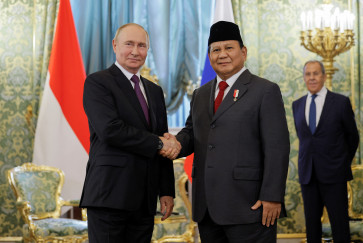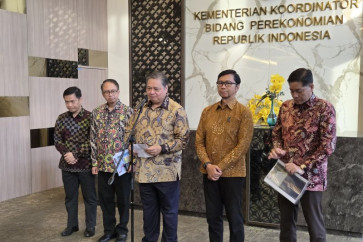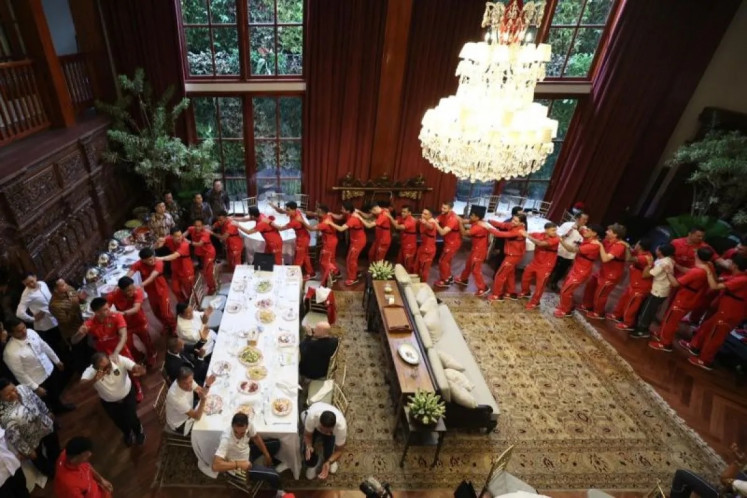Popular Reads
Top Results
Can't find what you're looking for?
View all search resultsPopular Reads
Top Results
Can't find what you're looking for?
View all search resultsThe sun, rain and the land are opportunities: Salim
The passing away of Liem Sioe Liong, also known as Sudono Salim, last month raises questions about the future course of the Salim Group business empire under the hand of his youngest son, Anthoni Salim, who first entered the family business as an executive in 1997
Change text size
Gift Premium Articles
to Anyone

T
he passing away of Liem Sioe Liong, also known as Sudono Salim, last month raises questions about the future course of the Salim Group business empire under the hand of his youngest son, Anthoni Salim, who first entered the family business as an executive in 1997. Last week, Anthoni invited several journalists to Bintan Resort, Riau Islands, to witness the signing of agreements between PT Indofood CBP and Japanese food and beverage maker Asahi. The Jakarta Post’s Linda Yulisman and other journalists talked to Anthoni about his vision for the family business. Below are excerpts of the interview.
Question: How do you see the economic situation in the world and particularly, Indonesia, lately?
Answer: Actually, in every period, crisis exists along with opportunities. It really depends on our vision. Europe and the United States are facing hardships, but it doesn’t mean there’s no opportunity.
If we project future trends, the world population of 7 billion at present will jump to 9.5 billion in the next 10 years, which means that there will be another market as big as China. This market needs products and services and whenever there’s a market, we should think of how we can fulfill those needs. Regionally, economies in China, India and ASEAN are growing.
Second, Indonesia has around 560 regencies nationwide, with a population of about three to four million each. This creates opportunities for us and it seems that Salim Group will be very busy.
Many units under the Salim Group, such as Indomaret and Bogasari, have yet to conduct initial public offerings (IPO). Do you have any plans to take any of these firms public?
There are several things to consider before our companies go public. First, the company must be qualified and ready to go public. Second, the company must be in need of additional capital for expansion and, finally, the situation in the capital market must be able to enable the firms to do so.
I think eventually our firms must go public. Why? If you want to grow bigger, the capital should be provided by the capital market. On top of that, once the companies go public, they will have outside governance, which is easier for us to maintain.
Are Indomaret or Bogasari ready in this case?
No, but there are many others. We haven’t thought of these two firms (for an IPO) because there are a lot of considerations.
You have several holdings in various sectors from food and beverage to property. Do you have any plans to unite these holdings?
No, because each one has its own specially. The most important thing for us is to maintain the structures that can best help us to provide value. So it is not necessary to create one holding that will not necessarily support us to achieve the highest value.
Another thing is that we consider becoming a public company is more important. Some firms have yet to go public because we still want to develop the firms, especially our start-ups. By staying private, we have more flexibility in managing them.
What is your vision for Salim Group now?
Well, Salim Group has not grown “by design”, but more out of accident or out of necessity. When my father came from China to Indonesia, he didn’t design Salim. Neither did I when I started to get involved. The market just gives us opportunities, which impacts our business structure.
Our structure always evolves with the changes and we have to adapt to those change. A lot of people say change is permanent, which is right. And changing yourself in order to adapt situations is the basic challenge. Every time technology changes, demand changes, markets change and products change.
We change every day. Take the case of our beverage business. We don’t have knowledge about the beverage business. If we already had the knowledge about the business, we wouldn’t want to seek out new partners.
If we don’t know, we try to learn and try to partner. We have to partner with the best firm of each
category. It’s a short cut.
So what is the next step for Salim Group?
There is the sun, rain and the land. For Salim Group, these are all opportunities that other countries don’t have. That’s why we are interested in commodities, in minerals and in energy.
What the equator can offer is a business. I am looking at the equator’s potential — fresh water, a lot of sun, a lot of rain, a lot of land, a lot of people. Being able to convert these things into business is the real opportunity.
What plans do you have for succession within Salim Group? You have now involved your son, Axton Salim, in running your business.
I have yet to retire. My son should undergo the learning process the way I did with my father, which took 20 years.
Now I have many “children”, like Thomas Tjie (one of Indofood’s directors), who are all my colleagues. What’s more important for me is that they each contribute to reaching our determined targets. So, whether it’s Axton Salim or Thomas Tjie, it would be the same for me.









